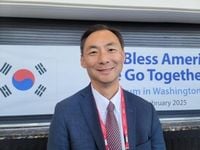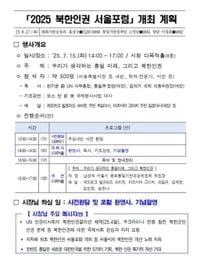Morse Tan, a former US Ambassador-at-Large for International Religious Freedom during the first Trump administration, has sparked a fierce controversy upon his arrival in South Korea on July 14, 2025. His visit, intended to include lectures and participation in events hosted by conservative and far-right groups, has ignited widespread backlash from Korean civil society, overseas Korean communities, and political circles both domestically and internationally.
Tan, whose Korean name is Dan Hyun-myung, landed at Incheon International Airport at 2:10 PM, greeted by a crowd of supporters chanting slogans such as "Free Democracy," "Stop the steal," and "USA." His arrival was largely unreported by mainstream Korean media, with news spreading primarily through internet outlets, independent media, and social networks. Tan's visit is scheduled to last five nights and six days, packed with a series of events including special lectures, meetings with civic groups, and media interviews.
However, the visit has been mired in controversy from the outset. Seoul National University (SNU) canceled the booking of its Hoam Faculty House for a special lecture by Tan, citing concerns that the event, organized by the conservative group Truth Forum, would disrupt education and research. The Truth Forum, closely linked with far-right circles and known for its association with the recently controversial Re:BACK School, responded by relocating the lecture to the university's main gate plaza and filing a rally report with the Gwanak Police Station. SNU has also indicated it will prohibit any march into campus following the rally.
Tan's claims have been at the heart of the backlash. He has repeatedly propagated conspiracy theories alleging election fraud in South Korea's presidential election and foreign interference, particularly by China. At a June 26 press conference at the National Press Club in Washington DC, Tan falsely asserted that President Lee Jae-myung was involved in a heinous crime as a child and imprisoned in a juvenile detention center—claims that courts have ruled as baseless fake news. These allegations have severely damaged Tan's credibility and fueled opposition from various sectors.
South Korean civic organizations abroad have been particularly vocal. The coalition Overseas Korean Action, representing overseas Koreans and civic groups from 12 countries and 55 cities—including the US, Canada, Germany, France, Japan, Singapore, and Australia—issued a joint statement on July 13, 2025, vehemently opposing Tan's entry. They condemned him as "a tool for political manipulation that undermines Korean democracy" and demanded immediate legal action, including entry bans, emergency arrest, and criminal indictment for defamation and election interference under Korean law.
Lee Jae-soo, coordinator of Overseas Korean Action, emphasized that allowing Tan's visit "is a serious mistake that gravely damages the self-esteem of the Republic of Korea and the honor of its citizens," urging the Korean government to respond decisively. Lawyer Park Dong-gyu and other overseas Koreans called for strict accountability, particularly if public funds were used for Tan's visit, demanding transparency from Seoul City and SNU regarding the invitation and budget details.
Seoul City had initially invited Tan as a keynote speaker for the 2025 North Korean Human Rights Seoul Forum but canceled or altered his participation amid the mounting controversy. Tan was also scheduled for other events, including a special lecture at Eunpyeong Jeil Church and meetings with youth groups and citizens near Seoul Station. Despite calls for banning his entry, Tan held a press conference at Incheon Airport announcing his visit and outlining plans to engage with international election monitoring groups, civic organizations, and political figures.
Tan's background adds layers to the controversy. Born in Seoul in 1974 and immigrating to the US in 1979, he is a devout conservative evangelical Christian, educated at Wheaton College and Northwestern University Law School. He has served as a law professor in both South Korea and the US and currently chairs the law school at Liberty University. His tenure as Ambassador-at-Large for International Religious Freedom under the Trump administration from December 2019 to January 2021 was marked by outspoken criticism of human rights abuses in North Korea.
His ties to Korean far-right groups became prominent in February 2025 at the Conservative Political Action Conference (CPAC) in Washington DC, where he introduced Yoon Seok-yeol as "the Donald Trump of Asia" and echoed conspiracy theories about election fraud, martial law declarations, and threats to Korean democracy from China and North Korea. Subsequently, Tan participated in rallies and events organized by domestic far-right groups, spreading allegations of vote manipulation, foreign interference, and election fraud.
These activities have drawn intense scrutiny and condemnation. Critics argue that Tan's claims are baseless and serve to destabilize South Korea's democratic processes. His involvement with groups like CPAC Korea, KAFSP, and Truth Forum, alongside connections with certain Korean politicians, has raised concerns about foreign political interference and the entanglement of extreme right-wing forces across the US and South Korea.
The Korean government finds itself in a difficult position, balancing diplomatic considerations with domestic political pressures and civil society demands. The controversy has sparked calls within the National Assembly for urgent plenary sessions to address the influence of far-right networks and to investigate ties between Korean and American conservative groups. Some voices advocate establishing a public investigation committee to scrutinize these connections and protect Korean democracy.
While Tan's supporters continue to rally behind him, the broader societal reaction underscores deep divisions and anxieties over foreign interference, misinformation, and the integrity of democratic institutions. The unfolding events around Morse Tan's visit are more than a diplomatic episode—they are a flashpoint in the ongoing struggle over political narratives, sovereignty, and the future of democracy in South Korea.
As the situation evolves, it remains to be seen how the Korean government will respond to mounting demands for transparency, accountability, and legal action. Meanwhile, Tan's presence and activities continue to provoke debate and mobilize both supporters and opponents, highlighting the complex interplay between domestic politics and international influences in the digital age.

![[속보] 모스 탄 전 미 대사, 인천공항 입국…'트럼프 복심' 방한에 정치권·시민사회 촉각](https://thumbor.evrimagaci.org/M8Wbqt4fi0oXgVKnsKTBEMzTgBg=/200x0/tpg%2Fsources%2Fcbffbe98-105a-4b34-b187-6c58d0741858.jpeg)

